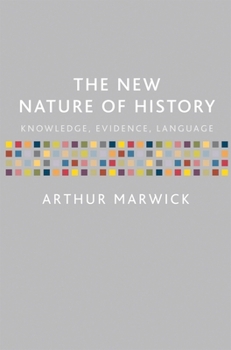The New Nature of History: Knowledge, Evidence, Language
Select Format
Select Condition 
Book Overview
This new title is a totally rewritten version of The Nature of History, first published in 1970, with revised editions in 1981, and again in 1989. Addressing the key questions of what history is, and... This description may be from another edition of this product.
Format:Hardcover
Language:English
ISBN:0333964470
ISBN13:9780333964477
Release Date:July 2001
Publisher:Bloomsbury Publishing PLC
Length:334 Pages
Weight:1.22 lbs.
Dimensions:0.8" x 5.5" x 8.5"
Customer Reviews
1 rating
A labor of love by a loyal practitioner of history
Published by Thriftbooks.com User , 17 years ago
When Arthur Marwick sat down to draft The New Nature of History he likely thought back to a time three decades earlier, when he penned The Nature of History (Alfred A. Knopf, 1971) to confront the "historical relativists," with their "varieties of history, embodying the notion that all great historians are essentially equal, though they may find it impossible to agree upon any one interpretation of the nature of history." (p. 22) In that earlier work, Marwick cautioned that "to stress the variousness of history is to turn one's face in the wrong direction." (p. 23) The aim of The New Nature of History is to shift historians' faces in the right direction, to secure the place of history against the assault of the discipline's post-modern critics. He argues that history, unlike literature, is dependent upon previous bodies of knowledge, primary sources, and precise writing, maintained by professional standards. As such, the book's subtitle "Knowledge, Evidence, Language" serves poignantly a three-word thesis statement. Knowledge is essential to Marwick's view of history. He offers a definition of history as "bodies of knowledge about the past and all that is involved in producing this knowledge, communicating it, and teaching about it." (p. 269) Accordingly, "what historians do is produce knowledge about the past." (p. xiii) Marwick sets forth a distinction between the past, "what actually happened in the (human) past (whether or not historians have written about it)", and history, "the accounts of the past provided by historians." (p. 25) Marwick views the search for universal meaning or universal explanations as futile; yet, contrary to post-modernist assertions, historians do not construct history. "History is about finding things out, and solving problems, rather than spinning narratives or telling stories." (p. 28) For Marwick, "a reasonable degree of objectivity" in history is achievable when historians adhere to the precedence of accumulated bodies of historians' work and respect the peer-reviewer system of professional scrutiny. (p. 45, 48) Marwick's conclusion places a great deal of faith in his fellow historians' observance of methods and principles that "govern" professional history. Marwick also shows much deference to the evidence upon which historians base their knowledge. In particular, he views primary sources as the bedrock of historical knowledge. "The only way we can have knowledge of the past is through studying the relics and traces left by past societies. (p. 26) Secondary sources are necessary to commence research. However, "primary sources...form the basic `raw material' of history." (p.26) He emphasizes that archival work with primary sources, while essential to the historian's trade, can be arduous and boring. According to Marwick, historians do not search the archives for facts, but for "material conditions, and changes in them; states of mind; the working of institutions; motivations, mentalities, va





